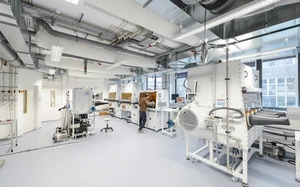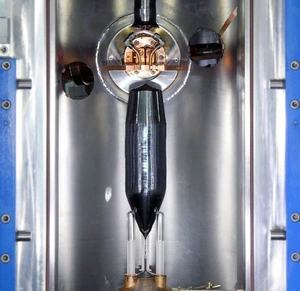News Archive

Accurate Probing of Magnetism with Light
MBI scientists provide the groundwork to interpret spectroscopic signals in dynamic microscopic processes:
Probing magnetic materials with extreme ultraviolet radiation allows to obtain a detailed microscopic picture of how magnetic systems interact with light – the fastest way to manipulate a magnetic material. A team of…

14th International Symposium on Functional π-Electron Systems in the Berlin-Adlershof Science and Technology park
More than 400 participants are expected to attend the conference on June 2nd to 7th, 2019:
The “14th International Symposium on Functional π-Electron Systems” is part of a regular international conference series that began in 1989 in Osaka, Japan. The 14th edition of this series is jointly organized by the…

Custom diode lasers and UV LEDs
FBH demonstrates systems for LiDAR & SERDS at Laser World of Photonics:
At Laser World of Photonics, FBH will present its capabilities in diode lasers and UV LEDs. It introduces compact live demonstrators for LiDAR and Raman spectroscopy. Results and advances in UV LEDs will be exhibited…

Success in funding of innovative research
Collaborative Research Centre 951 (CRC 951) receives funding by the DFG for another four years:
The Collaborative Research Centre 951 "HIOS - Hybrid Inorganic / Organic Systems for Opto-Electronics" (HIOS) will receive funding for another four years. This was decided by the German Research Foundation (DFG) at…

Launch of European Perovskite Initiative EPKI
HZB is participating in the initiative for the development of Perovskite based solar technology:
Perovskite based solar cells have made tremendous progress over the last decade achieving lab-scale efficiencies of 24.2% early 2019 in single-junction architecture and up to 28% in tandem (perovskite associated with…

The NEW KILOGRAM: Powered by Adlershof Technology
Leibniz-Institut für Kristallzüchtung (IKZ) helped to replace original masure by new International System of Units (SI):
In addition to Ampere, Kelvin, Mol and Co., the kilogram also is now defined by a natural constant. In concrete terms, this means that the original kilogram, which has been the measure of all things for 130 years, has…

New Chief Marketing Officer at PicoQuant
Frederik Siegmann strengthens the company’s aspiration to develop customer-centric solutions:
In September 2018, Frederik Siegmann joined PicoQuant as chief marketing officer to pursue a holistic approach including product management, marketing communication, and brand management. "We are very glad that we…

3D tomographic imagery reveals how lithium batteries age
Researchers have documented the degradation process of lithium electrodes in detail for the first time:
Lithium batteries lose amp-hour capacity over time. Microstructures can form on the electrodes with each new charge cycle, which further reduces battery capacity. Now an HZB team together with battery researchers from…

PicoQuant showcases the new Taiko PDL M1 at LASER World of PHOTONICS in Munich
The smart picosecond pulsed laser driver pairs an intuitive interface with unmatched operational flexibility:
During the LASER World of PHOTONICS trade fair taking place in Munich (Germany) from June 24 to 27, 2019, PicoQuant will present the latest additions to its photonics portfolio at booth #216, hall B2. Star of this…

Laser-driven spin dynamics in ferrimagnets: How does the angular momentum flow?
With “x-ray vision”, MBI scientists observe demagnetization process in different materials:
When exposed to intense laser pulses, the magnetization of a material can be manipulated very fast. Fundamentally, magnetization is connected to the angular momentum of the electrons in the material. A team of…

Adlershof Journal May/June 2019
Getting to the inside of things: The endless possibilities of analytical methods:
Help for asthma patients: Diagnoses by lasers // Light impulses for isotopes: Conclusive proof of product origin // Smart forestry: About rangers and woodpile scanners //

Digital Analytical Sciences: What makes them indispensable
Essay by Professor Ulrich Panne, president of the BAM Federal Institute for Materials Research and Testing, and speaker of the IGAFA Joint Initiative of Non-University Research Institutes in Adlershof.:
We live in a state of digitality. The term aims at describing a state of interconnectedness of “digital” and “analogue” reality, an interleaving with our lives that is spurring long-term changes in the relationship…

New head of the Centre for Biotechnology and the Environment
In conversation with Axel Gutzmer, WISTA Management GmbH:
As a business founder, Axel Gutzmer almost landed in Adlershof himself. His idea was to use drones for technical inspection of real estate. For his master’s thesis last year, the facility manager flew over the…

The Lightwave Researcher
Zsuzsanna Heiner, a physicist at the HU Graduate School SALSA, excites molecules by shooting them with lasers:
On some days, she stays until after midnight. She does so when she has been consumed by an idea, or a problem is stubbornly refusing to be solved. On days like these, she tells herself “No, not tomorrow – now!” This…

The Health Profilers
Berlin and Brandenburg’s state laboratory, Landeslabor Berlin-Brandenburg (LLBB), is strengthening Adlershof’s analytics know-how with 380 additional employees:
Lab analysts often work in the background. The importance of their activities for the future of humanity, however, is becoming increasingly apparent in many areas of the economy. Whether you look at the environment,…

Old Hands of the Analytical Sciences in Adlershof
Eurofins SOFIA and ACI Analytical Control Instruments show that tradition and innovation are by no means mutually exclusive:
Analytical sciences institutes and companies have a long tradition in Adlershof. Eurofins SOFIA and ACI Analytical Control Instruments have been active on the campus for 25 years and show that tradition and innovation…

Master of Layers
Surflay Nanotec develops nanometre-thin coatings that serve as biosensors and contribute to keeping Berlin’s water clean:
At first glance, the labs at Surflay Nanotec look like just like any other lab: ventilation, centrifuges, pipettes, and microscopes. Then you stumble upon a shelf that looks like it might belong in a barber shop.…

Non-Invasive Laser Cancer Diagnosis
Experts from the Ferdinand-Braun-Institute use Raman spectroscopy to help asthma patients:
A common cold with a runny nose and a plaguing cough is usually over after a few days. For people with asthma or chronic obstructive pulmonary disease, however, they can be a warning sign. Is this just a harmless…

Light Nudges for Isotopes
BAM research provides conclusive proof of origin from strawberries to poison gas, which could soon put a stop to counterfeiters and war criminals:
After having been awarded his PhD, Carlos Enrique Abad Andrade did not see any reason to turn his back on the BAM Federal Institute for Materials Research and Testing in Adlershof. Instead he decided to continue to…

Berlin Adlershof: Facts and Figures
The Berlin Adlershof Science City is one of the most successful high-technology sites in Germany and Berlin’s largest media site. It is home to 1,144 companies and scientific institutions (Dec 2018) on an area of…